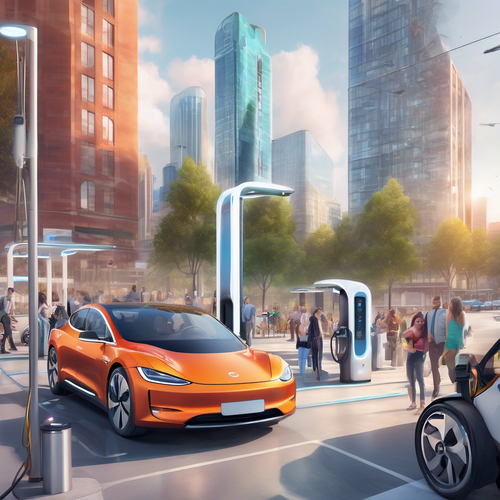Uber and Momenta to Test Autonomous Vehicles in Germany by 2026 🏎️🤖
In a world where the idea of self-driving cars has stirred a pot of excitement, skepticism, and perhaps a hint of dread, Uber’s partnership with Momenta for autonomous vehicle testing in Germany by 2026 appears as both an audacious leap and a cautious step. Could this be the moment when human drivers, burdened by traffic tickets and road rage, are made obsolete like floppy disks and dial-up modems? 📅
The notion of vehicles that navigate streets like birds in flight is not merely a fantasy conjured by tech evangelists; it’s an endeavor fueled by profound investments and groundbreaking innovation. While the exact specifications and functionalities of these autonomous vehicles remain shrouded in corporate secrecy, one cannot help but wonder—will these robotic chauffeurs learn how to navigate the notoriously unpredictable whims of human behavior? 🚦
The Landscape of Autonomous Technologies
The collaboration between Uber and Momenta, a Chinese artificial intelligence company, signifies a merging of Western ambition with Eastern ingenuity. It’s akin to blending fine French wine with a robust Chianti—each entity brings a unique flair and expertise to the table. Uber, with its extensive global footprint, offers a gargantuan testing ground, while Momenta contributes its sophisticated algorithms that could make these vehicles as adept as a seasoned taxi driver who knows all the shortcuts. But will this be enough to appease regulators and safety advocates in Germany?
Germany, renowned for its audacious autobahns and stringent vehicle standards, presents both opportunity and challenge. The country has long been synonymous with automotive excellence, its streets a canvas painted by Mercedes, BMW, and Audi. The prospect of Uber and Momenta’s self-driving cars zipping alongside these celebrated brands could be reflective of a new era in public transportation—one where ‘driven’ becomes just a state of mind. 🇩🇪
Regulatory Hurdles: The Roadmap Ahead
Despite the scintillating allure of autonomous vehicles, one cannot overlook the regulatory quagmire that lies ahead. Imagine trying to serenade a swarm of bees; one wrong note could send them buzzing in all directions. The German government, keen not to repeat the pitfalls seen in other nations, will undoubtedly approach these tests with a cautious yet observant eye. Will Uber and Momenta find favor in the hearts of regulators, or will they face the sting of bureaucracy?
Autonomous vehicle legislation is a labyrinthine affair, often tangled in safety concerns, ethical dilemmas, and public acceptance. The German populace is known for its skeptical take on anything that disrupts the status quo—a contrast à la Dickens, where “it was the best of times, it was the worst of times.” Will cities, accustomed to human drivers, adapt to the alien presence of self-driving cars that may not grasp the nuances of local customs? 🚧
- Liability Issues: Who is responsible when an autonomous vehicle gets into an accident? 🤔
- Public Perception: Will passengers feel comfortable entrusting their safety to a computer program? 🚘
- Infrastructure Needs: Are cities ready to reshape their landscapes, integrating technology that communicates with vehicles? 🏙️
Societal Impact: Embracing the Future or Fighting the Tide?
As we hurtle down the path to 2026, the societal implications of Uber and Momenta’s venture loom large. Autonomous vehicles promise to alleviate urban congestion, reduce traffic accidents, and even lower emissions. But these advancements also prompt us to ponder—what does the rise of self-driving cars mean for employment in the transportation sector? Are we, like the proverbial canaries in a coal mine, unwittingly stepping into a future where driving becomes an antiquated skill, lost to a generation that prefers to scroll through TikTok rather than grip the steering wheel? 📱
Moreover, the potential for reshaping urban landscapes is tantalizing yet daunting. What happens to the dedicated taxi ranks and parking lots of yore? As towns evolve to accommodate fleets of autonomous vehicles, are we staring down the barrel of a future where our streets resemble an intricate dance choreographed not by humans, but by algorithms? 💃
A New Chapter in Urban Mobility 📚
To envision a city that embraces self-driving cars is to consider a holistic approach to urban planning—a world where transportation systems are seamless, connected, and efficient. But emerging from the shadows of innovation, we must remain vigilant. Would you be willing to bet your life on a machine? This poignant question adds a layer of irony to the phenomenal progress we are witnessing. 🚀
Final Thoughts: Navigating Uncertainty
The partnership between Uber and Momenta in testing autonomous vehicles in Germany could very well redefine transportation as we know it, but not without a series of challenges that require thoughtful navigation. As we contemplate this brave new world, the question remains: can society adapt to the rapid pace of technological change while safeguarding the values and jobs that make our communities vibrant? Maybe, just maybe, there’s plenty of room for both the driver and the driverless vehicle—after all, when it comes to progress, there ought to be space for collaboration rather than competition. 🛣️




